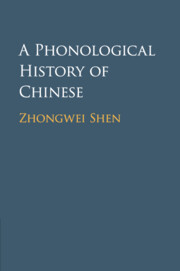Book contents
- A Phonological History of Chinese
- A Phonological History of Chinese
- Copyright page
- Contents
- Figures
- Tables
- Foreword by William S-Y. Wang 王士元
- Preface
- Major Periods of Chinese History
- Locations of Ancient Capitals of China
- Part I The Keys to Traditional Phonology
- Part II Old Chinese
- Part III Middle Chinese
- Part IV The Beginnings of Mandarin
- Part V A New Standard
- Part VI Toward Modern Mandarin
- 9 The Mandarin of the Ming Dynasty
- 10 The Mandarin of the Qing Dynasty and the Modern Era
- References
- Index
10 - The Mandarin of the Qing Dynasty and the Modern Era
from Part VI - Toward Modern Mandarin
Published online by Cambridge University Press: 09 June 2020
- A Phonological History of Chinese
- A Phonological History of Chinese
- Copyright page
- Contents
- Figures
- Tables
- Foreword by William S-Y. Wang 王士元
- Preface
- Major Periods of Chinese History
- Locations of Ancient Capitals of China
- Part I The Keys to Traditional Phonology
- Part II Old Chinese
- Part III Middle Chinese
- Part IV The Beginnings of Mandarin
- Part V A New Standard
- Part VI Toward Modern Mandarin
- 9 The Mandarin of the Ming Dynasty
- 10 The Mandarin of the Qing Dynasty and the Modern Era
- References
- Index
Summary
The Manchus formed the Qing dynasty in 1636 and became the rulers of China in 1644. In the Qing dynasty there was also an effort by the government to establish a phonological standard, and in pursuit of this goal the Yùdìng Pèiwén Yùnfǔ 御定佩文韻府 was published in 1711. This rhyme dictionary did not follow the Hóngwǔ Zhèngyùn of 1375. Instead it followed the earlier rhyming tradition, the Píngshuǐ Yùn 平水韻 of the thirteenth century. The Imperial Era of China ended in 1911. The capital of the Republic of China started in Nanjing. It switched to Beijing and then back to Nanjing. The colloquial pronunciation of the then Beijing dialect was well transcribed in the Yǔyán zì ěr jí 語言自邇集 Yü-yen tzǔ-êrh chi: A Progressive Course Designed to Assist the Student of Colloquial Chinese by Thomas Francis Wade (1818–1895). In 1949, after the Chinese civil war, the capital of the People’s Republic of China was established in Beijing. The Beijing dialect was chosen as the base for the national standard pronunciation during both time periods.
Keywords
- Type
- Chapter
- Information
- A Phonological History of Chinese , pp. 360 - 384Publisher: Cambridge University PressPrint publication year: 2020

